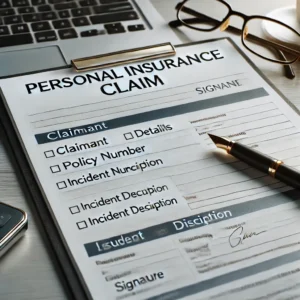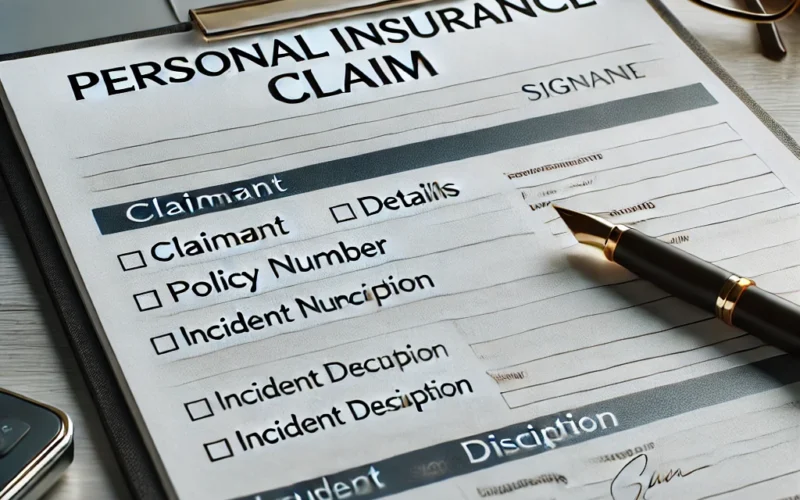When dealing with the aftermath of a car accident or personal injury incident, one of the concerns individuals often face is whether filing a personal injury claim will affect their insurance. Understanding the potential implications of filing a claim is crucial in making informed decisions about pursuing compensation for injuries sustained as a result of another person’s negligence or fault.
In many cases, filing a personal injury claim can indeed lead to future increases in insurance premiums, regardless of whether or not the claimant was at fault in the accident. This is because insurance companies factor in potential risks when determining premium rates, and a history of claims can indicate a higher risk to the insurer. However, the extent of any premium increase may vary, depending on the details surrounding the claim and the individual’s prior claim history.
Key Takeaways
- Filing a personal injury claim may lead to increased insurance premiums in the future.
- The extent of premium increases depends on the details of the claim and the claimant’s history.
- Understanding the implications of filing a claim is crucial for making informed decisions.

Understanding Personal Injury Claims
In the context of insurance, a personal injury claim arises when an individual seeks compensation for injuries sustained in an accident. These claims can affect the insurance premiums, coverage, and responsibilities of the involved parties, depending on their roles in the accident.
Distinguishing Fault and Non-fault Claims
Fault claims occur when the insurer determines that their policyholder is primarily responsible for the accident. In these cases, the injured party’s insurance company pays for their costs, and the at-fault policyholder may see an increase in their insurance premiums. On the other hand, non-fault claims involve accidents where the policyholder is not primarily responsible. In this scenario, the at-fault party’s insurer will cover the costs of the injuries, and the non-fault policyholder’s insurance premiums will generally not be affected.
Role of Insurer in Personal Injury Claims
Insurers play a crucial role in the personal injury claim process. They assess the accident, determine the fault, and handle the claim compensation. If a policyholder is found at fault, their insurer may need to cover the costs of the injured party, including medical bills and property damage. Consequently, the fault policyholder’s premiums may increase.
However, if a policyholder is involved in a non-fault accident, they may still need to inform their insurer about the incident. The insurer can then offer support and guidance, as they might be contacted by the at-fault party or their insurance company for further information and possible compensation.
In both fault and non-fault claims, the insurer’s primary responsibility is to protect their policyholder’s interests and handle the logistics of the claim process, ensuring a smooth experience for everyone involved.
The Implication of Making a Claim
When considering making a personal injury claim, it’s important to understand the potential implications on your car insurance. In this section, we will discuss the impact on car insurance premiums and how non-fault claims can influence your insurance.
Impact on Car Insurance
Making a personal injury claim may have some effect on your car insurance premiums. If you were driving your vehicle at the time of the accident, as opposed to being a passenger in another person’s vehicle, a pedestrian, or a cyclist, you’ll be required to report the accident to your insurer. This report may cause your premiums to increase. However, it’s essential to understand that each insurance company has different policies, so the impact may vary.
It’s crucial to carefully review your insurance policy and speak with your insurance provider about how making a claim might affect your premiums. Some policies have specific clauses detailing the circumstances under which your premiums may increase, and understanding these clauses can help you make an informed decision.
Non-fault Claim and Its Influence
A non-fault claim occurs when an accident or injury is not your fault, and you file a claim against the responsible party’s insurance provider. In most cases, a non-fault personal injury claim shouldn’t directly impact your insurance premiums since your insurer won’t be paying out. However, the claim may still become part of your insurance history, which could result in increased premiums in the future.
When making a non-fault claim, it’s crucial to gather evidence supporting your case, such as photographs of the accident scene, witness statements, and police reports. Having strong evidence will not only help your claim but can also potentially minimize the impact on your car insurance premiums.
In conclusion, making a personal injury claim can have various implications on car insurance. Understanding the potential outcomes will help you make an informed decision regarding your claim.
Considering the Financial Aspects
When evaluating the impact of a personal injury claim on your insurance, it’s essential to consider various financial aspects. This section will cover the costs and excess related to insurance and how compensation might affect your benefits.
Costs and Excess
Filing a personal injury claim can indeed affect your car insurance premiums. The extent of the increase, however, depends on who was at fault in the accident and whether you were driving your car or were injured as a non-car road user1. An insurance policy typically has an excess, which is the amount you must pay towards any claim before the insurer covers the remaining costs. This excess can be higher if the claim is for personal injury rather than property damage.
Compensation and Benefits
When making a personal injury claim, it’s also crucial to consider how the compensation might affect any existing benefits you receive, such as Jobseeker’s Allowance, Pension Credit, Universal Credit, or Income Support. If the compensation amount exceeds certain financial thresholds, your eligibility to receive benefits may be impacted2.
For example, if you receive a lump sum settlement for your personal injury claim, it may be considered as part of your income. This could result in a reduction of your benefits or even their cancelation, depending on the value of the settlement and the benefit thresholds. To avoid this, you could set up a personal injury trust, which holds the compensation separately from your other financial assets. This would prevent the lump sum from affecting your benefits and ensure that you continue to receive support.
Footnotes
The Incident and Reporting Process
In the event of a personal injury incident, various steps need to be taken to ensure that you’re fully informed and able to present accurate details to your insurance provider. This is crucial in determining the potential impact on your insurance premiums.
Determining Liability
The first step after an accident is to determine who was at fault. Gather information such as the name, address, and vehicle registration of all parties involved. It’s important to establish liability because this will play a significant role in how your insurance claim is handled. If the collision is deemed to be a result of another party’s negligence, your insurance claim may be directed towards their policy instead.
While assessing the situation, take photos of the damage to the vehicles or any property involved, and note any witnesses who can provide statements about the incident. Collecting this evidence may help support your claim and make it easier for your insurance provider to process your case.
Understanding Insurance Details
Once you have gathered sufficient information about the accident, report the incident to your insurance provider, even if you decide not to file a claim. Informing your insurance company of the accident is crucial because it helps them protect your interests in case a third party decides to file a claim against you later on.
During the reporting process, ensure you provide accurate details about the incident, including the location, date, and time of the event. Failing to report the accident or providing incomplete or inaccurate information could lead to complications or a denial of your claim.
While submitting your claim, it’s essential to understand what your insurance policy covers. Familiarize yourself with your insurance’s coverage limits, deductible, and other pertinent details that can affect the outcome of your claim. Knowing this information will help you have a clearer understanding of the potential impact on your insurance premium once your claim has been processed.
In conclusion, the incident and reporting process play a crucial role in determining the impact of a personal injury claim on your insurance. By carefully following the above-mentioned steps, you can help to minimize potential consequences and ensure a smooth claim submission.
Dispute Resolution and Legal Ramifications
Seeking Legal Advice
In cases where a personal injury claim is in dispute, it is highly recommended to seek the help of a solicitor. A professional solicitor can provide sound advice, guide you through the process, and represent you in negotiations. If negligence is involved, your solicitor can help you understand the strength of your claim and explore the possibility of obtaining compensation.
During the legal process, it’s essential to gather all necessary evidence to support your case. Your solicitor may need documentation such as medical records, photographs of injuries or damage sustained and witness statements to build a strong case on your behalf. Remember, a well-prepared case will significantly increase your chances of a successful resolution.
Complaints and Appeals
If you’re unhappy with the decision made by your insurer regarding your personal injury claim or their handling of your case, you have the right to complain. Start by contacting your insurance company and discussing your concerns, as they may be able to resolve the issue internally.
In the event your complaint remains unresolved, you can escalate the matter to the Financial Ombudsman Service (FOS). The FOS can help mediate disputes between policyholders and insurers, and they have the authority to make legally binding decisions on behalf of both parties.
If the dispute over your personal injury claim involves a smaller claim amount, you can also consider taking the case to a small claims court. Small claims courts are typically more accessible and less formal than other courts, making them a suitable option for resolving minor disputes without incurring high legal fees.
Dispute resolution and understanding legal ramifications are critical aspects of dealing with personal injury claims, insurance disputes, and potential appeals. By seeking legal guidance and being aware of your rights, you can navigate the complexities of the process and work toward a fair resolution.
Precautions and Recommendations
Maintaining Honesty
When making a personal injury claim, it is crucial to maintain honesty throughout the process. This includes providing accurate information about the accident, injuries sustained, and any relevant documentation. Failure to be honest could lead to difficulties with your claim or even result in a denied claim. Moreover, honesty is essential for maintaining a good relationship with your insurer and avoiding any potential consequences, such as increased premiums or cancellation of your policy.
Risk and Security Considerations
In the context of personal injury claims, risk and security considerations should be taken into account to protect your interests and adhere to your insurance policy’s terms and conditions. Some of the key aspects to consider include:
- Risk assessment: Understand the potential risks associated with making a claim, such as increased insurance premiums or the loss of no-claim bonuses. It is essential to weigh the possible benefits of pursuing a claim against these risks to determine the best course of action.
- Security measures: It is necessary to take appropriate security measures, such as safeguarding personal information and ensuring that relevant documents are stored securely. This helps protect your privacy and reduces the risk of theft or unauthorized access to your data.
- Compliance with terms and conditions: Adhering to the terms and conditions of your insurance policy is crucial for the smooth processing of your claim. Failing to comply with these terms might lead to complications or even rejection of your claim. Make sure you are familiar with your policy’s terms and conditions, and consistently follow them throughout the claim process.
By addressing these risk and security considerations, you can better protect your interests and ensure a positive outcome for your personal injury claim.












